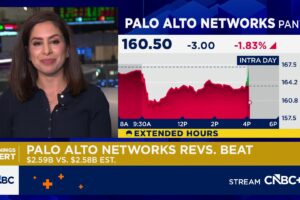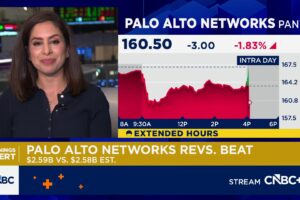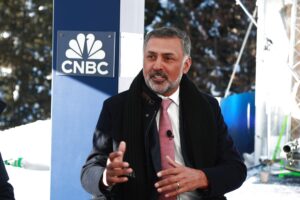
Bloomberg
LG, SK Reach $1.8 Billion Settlement to End EV Battery Spat
(Bloomberg) — Two South Korean electric-vehicle battery makers reached a last-minute settlement in a bitter U.S. trade dispute, sparing President Joe Biden from choosing between undermining intellectual property rights or dealing a politically toxic blow to his climate agenda.SK Innovation Co. agreed to pay 2 trillion won ($1.8 billion) to LG Energy Solution, a unit of LG Chem Ltd., according to a statement from the two companies. The payment is divided equally in cash and royalties, they said.Shares of SK Innovation surged as much as 18% in early Seoul, and was trading while LG Chem gained as much as 4%. The deal is a “major positive” for SK Innovation, Morgan Stanley analysts said in a note to clients.“This settlement should allow SKI to reap the long-term benefit of EV proliferation in the U.S.,” Morgan Stanley analysts including Young Suk Shin said. The analysts raised their rating to overweight with a price target of 330,000 won, implying a 39% upside potential to the shares from Friday’s close.The two companies “will work to help the development of EV battery industry in South Korea and the U.S. through healthy competition and friendly cooperation,” according to the joint statement. “In particular, we will work together to strengthen the battery network and environmentally-friendly policy that the Biden administration is pursuing.”The settlement will avert a 10-year import ban of SK Innovation’s batteries into the U.S. and ends the two-year dispute between the two companies. The import ban threatened to complicate the rollout of Ford Motor Co.’s new F-150 electric pickup truck and the Volkswagen AG’s ID.4 SUV, both due to begin production next year with EV batteries assembled at an SK Innovation plant in politically important Georgia.Political ConundrumThe dispute became a political conundrum for Biden because it was said to jeopardize as many as 6,000 battery manufacturing jobs in Georgia, prompting the state’s two Democratic senators and Republican governor to urge an intervention by the president. One of those senators faces re-election next year.“This settlement agreement is a win for American workers and the American auto industry,” Biden said in a statement Sunday. U.S. Trade Representative Katherine Tai said the deal follows “significant engagement” by the administration.SK and LG also agreed to withdraw all lawsuits lodged in South Korea and overseas, according to the statement. They also agreed not to undertake any legal action against each other for the next 10 years.The settlement removes a major headache for both South Korean and U.S. government officials, who’ve spent weeks pressing the two sides to reach an agreement. Biden was facing an April 11 deadline to decide whether to overturn the import ban or do nothing and let it take effect. His decision pivoted on two critical policy issues — the new president’s desire to promote EVs as a way to help curb climate change, and the nation’s long-standing backing of strong intellectual property rights.The U.S. International Trade Commission, an independent agency set up to protect U.S. markets from unfair trade practices, had issued the import ban Feb. 10 based on what it called an “extraordinary” effort by SK Innovation to destroy evidence in a trade-secret case lodged by LG Energy. The ITC did carve out time to let SK Innovation import components for batteries to be assembled in Georgia for Ford and Volkswagen vehicles, but the automakers argued it was not enough.Both auto-makers expressed relief at the settlement.“We are pleased the two battery suppliers at the center of this recent trade dispute have come together and solved their differences,” Scott Keogh, president and CEO at Volkswagen Group of America, said in a statement. “Our complete focus now shifts to where it should be; the start of U.S. production of the all-electric ID.4 SUV in 2022, assembled by proud, skilled workers in Tennessee.”Ford, in a statement, said it could focus now on delivering a range of electric vehicles “for our retail and fleet customers, while also supporting American workers, the economy and our shared goal of protecting the planet.”Tai, who has been in her position less than a month and whose office is designated to take the lead in these cases, held meetings with the parties as the deadline loomed. Georgia officials, including the two recently-elected Democratic Senators critical to Biden’s agenda, also met with senior company executives and administration officials.The case prompted an extraordinary effort to lobby the Biden administration, with near-daily meetings over recent weeks involving officials from a dozen government agencies and officials from both companies and the automakers. LG and SK spent more than $1 million last year on lobbying efforts, according to data collected by the Center for Responsive Politics.Senator Jon Ossoff “was stressing the urgent need for both companies to come to the negotiating table and agree to a settlement to save the Georgia plant,” said Miryam Lipper, a spokeswoman for the Democratic senator. His fellow Democrat, Senator Raphael Warnock, who’s up for re-election in 2022, also had called for a resolution, describing the looming import ban as a “severe punch in the gut” to Georgia’s workers.Georgia Governor Brian Kemp, a Republican, had called on Biden to veto the import ban while accusing the president of responsibility for Major League Baseball’s decision to move its All-Star game because of the state’s new voting law and costing the state jobs.He called the settlement “fantastic news for northeast Georgia” and the state’s growing EV industry, while the state’s economic development agency declared itself “ecstatic” at the “positive outcome for all parties.”Climate ChangeSK Innovation argued the order would undermine Biden’s push for more American-made EVs as part an effort to combat climate change.The commission said it had already taken the president’s policies into account when fashioning a carve-out that allowed SK Innovation to bring in components needed for Ford’s EV F-150 pickup for four years, and for Volkswagen’s American ID.4 SUV line for two years. Neither carmaker was appeased.LG Energy, which makes batteries for General Motors Co. in Michigan, said such a decision would weaken policies to protect trade secrets — a long-standing issue in U.S. talks with China — and that the carve-outs ensures Ford and Volkswagen had time to adjust.LG Energy accused SK Innovation of stealing billions of dollars’ worth of crucial information on how to make batteries, enabling it to win the contracts from Ford and Volkswagen. SK Innovation denied receiving or using any confidential information from the LG Energy employees it hired.SK Innovation is nearing completion of one facility in Commerce, Georgia, and is already making battery samples, while a second facility is about 20% complete and projected to be done next year. A second phase is planned that would bring SK Innovation’s total investment to about $5 billion and create 6,000 jobs, the company has said.“Georgia’s incredible economic development success continues to gain momentum, and we remain 100% committed to developing the entire electric vehicle supply chain right here in our state,” said Pat Wilson, commissioner of the Georgia Department of Economic Development.Non-Captive PlantIn addition to making the batteries for Ford and Volkswagen, the SK Innovation facility would be the nation’s largest so-called non-captive plant, meaning it would be able to adapt for other manufacturers, the company has said.LG, which is building an additional plant with GM in Ohio in addition to its facility in Holland, Michigan, has announced plans to invest $4.5 billion in the U.S. by 2025 and hire 10,000 workers to expand battery capacity.Creating more U.S.-based manufacturing is critical because the automakers want components close to their assembly plants, especially since a shortage of computer chips has highlighted vulnerabilities for global supply chains. The supply of batteries for a coming wave of electric models is also extremely tight.Biden has committed to creating more American-made manufacturing, particularly to compete with China. The Asian nation makes 73% of the world’s lithium-ion batteries compared with 12% by the U.S., which ranks No. 2, Jonathan Jennings, Ford’s global commodity pricing vice president, told the Senate Finance Committee on March 16.The case is In the Matter of Certain Lithium Ion Batteries, Battery Cells, Battery Modules, Battery Packs, Components Thereof and Processes Therefor, 337-1159, U.S. International Trade.For more articles like this, please visit us at bloomberg.comSubscribe now to stay ahead with the most trusted business news source.©2021 Bloomberg L.P.








